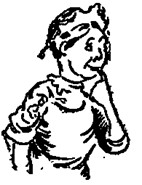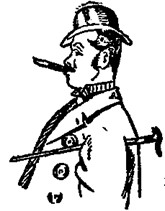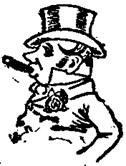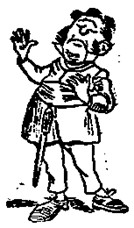This article has been transcribed from a copy of the Cardiff Times in the online collection of scanned Welsh newspapers 1804-1919 in the National Library of Wales, with grateful recognition of the free access accorded to all readers. Paragraph breaks have been introduced for easier reading.
This article is written from the viewpoint of lower-middle-class customers, and suggests that butchers were frequently overcharging their customers. Their techniques such as false arithmetic at high speed persisted (notably in petrol stations) until the mid-twentieth century, when mechanised tills became universal. The article is an interesting contrast with accounts of butchers written from the viewpoint of wealthier households, whose senior servants (butler and cook) made the majority of routine purchases. In these cases (e.g. Anthony Trollope’s London Tradesmen) the emphasis is on an agreement between the servant and the tradesman to overcharge by a few percent (Trollope suggests 5%), and share the excess. Samuel’s standing is sufficient for his household to run up accounts with the butcher rather than pay separately in cash for each purchase, but when the account is brought round to the house, it may be a work of fiction – just one of the multitude of insecurities of the Victorian middle classes. As so often, Samuel notes important, modern changes, such as the landing of the first consignment of frozen meat from Australia in January 1881. — David Skilton

AKE notice, all ye butchers need not butcher — [your]selves about in regard to my treating of you in the present chapter, for as a general rule I entertain a most becoming feeling of respect for the ‘craft’; in fact, it is meet that I should. And let me tell you, sir, that for the most part ‘Beefoss, the Butcher,’ is a very good- natured, stalwart, decent fellow – and a superb arithmetician. Let us take your young butcher first – let us take him in his workaday aspect. He is generally sturdy; he almost invariably has a fat neck, and he always has his hair neatly suet-ed down, to the great admiration of susceptible servant girls – and he is as tender as spring lamb where the female sex is concerned. In this regard notice how pleasantly he banters the young female persons who patronise his master's shop. ‘Good morning, my lady,’ he will say with a mock obeisance to the kitchen-maid from No. 9 round the corner, ‘what can I serve your Royal Highness with this morning?’ and he will, so to speak, applaud his own remark by tapping lightly on his steel with his knife, and it is quite probable that if the young female person aforesaid be of an affable disposition he will give her extra weight; he will cut her off ‘one of the best bits in the beast,’ as he would express it; he will throw a nice piece of suet into the scale, as though by so doing to express the fact that he would fain prosecute his suet – or suit, if you like it better. If he be a salesman in the market he developes’ [sic] a marked talent for humour; he has nicknames for al[l] his associates; one we will say, is ‘Punch,’ another ‘Roarer,’ another ‘Mumble-chops,’ and he beguiles the hours by chopping ([speaking of them] not a bad word as applied to a butcher, sir) 'em. His ‘Now then, meat buyers,’ has a cheery ring about it, and his harangues to the mob are generally both forcible and humorous.

The girl that the butcher makes “sheep’s eyes” a
As for the meat he sells, you would positively think that he entertained a burning, overwhelming affection for every scrap of it. ‘There's a grand bit, ma'am,’ he will say to a dirty old Irishwoman, ‘look at that and weep,’ and he will tap a ‘scrag’ of some kind lovingly with the flat of his knife. ‘None o' yer cats' meat, this. It's a proper bit of the right sort, eightpence a pound; here, Bill, weigh this for the lady’; and ‘Bill’ has it weighed before the old woman can say a word. You will usually note the fact that when a working woman is likely to be a customer, he, with a tremendous show of deference, will address her as ‘Ma'am.’ On the other hand, should she turn away in a dissatisfied sort of way, without making a purchase, he will shout ‘Hi, Missis’ after her. He has a fine eye for character, the British Butcher. When he sees a young and evidently newly-married couple pause before his shop, he pounces upon them with the most business-like avidity. ‘What does this weigh?’ asks the lady, pointing to a piece of beef. This gives him the opportunity of flattering both husband and wife. ‘Tell you in a minute, mum,’ he says. ‘Ah, you know what good beef is; one of the best bits in the shop; last yer all the week, mum; niver wish to eat a better bit myself,’ and then he turns to the husband and remarks, with a pressure of a very big and distorted thumb (profusely illustrated with cuts) upon the lumps of meat, ‘As tender as butter, that's what it is.’ I have mentioned his fine and large talent for arithmetic. This is seen at its best when business is at the brisket –briskest, I mean. He calculates at lightening [sic] speed, something after this style, and he never makes a mistake – on your side: – ‘Hi, hi, sold again, four pounds and a quarter, four nines are thirty-eight, thirty-eight pence, three and sixpence; throw the quarter of a pound in – four and three-halfpence, ma'am, please!’ This is so rapidly delivered that it is impossible to follow him, and he has the lump of meat in your basket and is counting the very greasy change before you have time even to cough or sneeze. If you are sharp enough to remind him that he has miscalculated, it is surprising what an amount of regret he expresses. Yes, the ready-money butcher is nearly always an obliging and polite man[.] Mark how he offers to weigh you anything in the shop; he positively gives one the impression that he would weigh the shop too, if you asked him. But he has his moments of irritation. These for the most part occur when some dilapidated and dingy-fingered old woman has turned and twisted nearly every piece of meat on the slab over. Roused to indignation at last, he will say, ‘Now then, Missis, we have no dog beef here – keep yer claws off,’ and he will tap on the slab in dangerous proximity to the old woman's digits. He has even been known to suddenly carve human fingers when he has seen them abstracting his wares.

‘Oh, we are a toff.’ See his pa below.
In private life the young butcher is of an eminently festive and rollicking disposition. He affects the lightest of violent checks in the way of suits his trousers are most distressingly tight; his billycock[i] is of the jauntiest cut; his hair has been elaborately re-dripping-ed; he is generally thoroughly happy. No cloud seems to dim the brightness of his life – save a boil at the back of his expansive neck, this constituting a form of ailment to which he is particularly liable. He is essentially a sporting man in private life, and generally has a friend who is a bookmaker. Though in his business capacity he would scorn to ‘own up’ to any knowledge of horseflesh, yet is he in his holiday moments a true lover of Le Sport. He likes to go out driving with a friend in his master's dog-cart; on such occasions he stops frequently on the road ‘to bait,’ and whenever you read of a trap accident, make up your mind that a young butcher has been in it.

The family butcher, Pa to the above.
I do not, I cannot, believe that the occupation of butchering in any way brutalises a man, for I have found that butchers are by no means more adamantine-hearted than their fellows. Their very appearance belies any assertion to their callousness. Their almost universally sleek and well-fed appearance, begotten of fat profits and contact with animal matter, is of course no very strong argument as to their good nature, but I have generally found from experience, sir, that of all tradesmen whose bills have been long outstanding the family butcher is the most open to reasonable argument, and it is for this reason that I cherish such a high opinion of his intelligence and amiability. He may not possess redundance of the finer feelings, but he always gives trust where there is a reasonable prospect of being paid. I admit the family butcher has faults. His memory for instance, is faulty. When you have a running account with him he has a little weakness in the way of inserting in the final bill the record of old joints which you, for your part, cannot remember to have consumed, and he has what I might call a magnifying memory as to the respective weights of the articles you have purchased from him. Of course, a few legs of mutton, sweetbreads, and kidneys thrown in are nothing – to him. Nothing can, I have found, dissipate from his mind the idea that ‘tick’ customers are more fond than their fellows of large quantities of bone, fat, and gristle. Considering his great professional experience, too, it is somewhat strange that he should so persistently confound to his own advantage ‘best steak’ (steak bone) with an inferior and leathery kind – but of course all men are liable to error.

The ‘igh and ‘aughty, and by no means haffable bucher.
The family butcher is a useful public servant; he is always ready with the most fatherly advice in the way of meat-buying to young married ladies with money to spend, and you will find that, however excellent a butcher he may be from a professional point of view, he always makes mistakes when he is cutting you a piece of meat you have ordered. Thus, if you desire two pounds of steak, it is highly probable that his judgment will be at fault, and that he will cut you about half a pound more than you required. Singular to say, it is seldom that he makes any error on the other side. In his private relations, he[,] is nothing if not respectable for the most part, he wears a huge watch-chain, and a watch that you might hide in if you were fleeing from justice; he attends a place of worship; he dresses well, if somewhat greasily, and he is invariably a politician of the robust order, his leaning being to the preservation of all ancient institutions – and especially of butchering and butchers' profits. He likes ‘a good bit o' British beef,’ or mutton, but for the colonies (and especially Australia) he has a not unnatural contempt. If you wish to see lofty scorn becomingly expressed, ask him what he thinks about tinned and frozen (usually pronounced ‘frozzen’ by him) meat.[ii] Take care to be out of reach of his cleaver when he is giving vent to his feelings, or you may act the principal part in an inquest show. He has his little pleasures; the love of his youth – that is to say, driving out – is one of these, and gin and water (particularly when he goes cattle buying) is another. But I must again assert that the butcher is an estimable character; he is, despite his occupation, seldom sheepish, he hardly ever makes bulls [blunders], he never steels his heart to the appeals of distressed man of his own trade; he – well, I know that few will attempt to upset my estimate of his good qualities.
P.S. – I am an excellent judge of meat, and if any gentleman in the butchering trade wants a test of my abilities, he had better send round to your office – but, mind you, let there be no tricks.
Links to Related Material
- “The Sirloin Superseded” and “Beef from Botany Bay” [poems](1872)
- “Christmas and Australian Beef-Eaters” [Essay](1873)
- Ha, Ha! You Must Learn to Love Me (Cartoon; Australian canned beef, 1873)
- How to Improve London. — No. 4. Billingsgate Market (the Arrival of Frozen Food in London (1881)
- “We now live on Australian beef”: Mentions of Canned Australian Beef in Judy (1873-79
Last modified 28 January 2022
Links added 17 March 2022